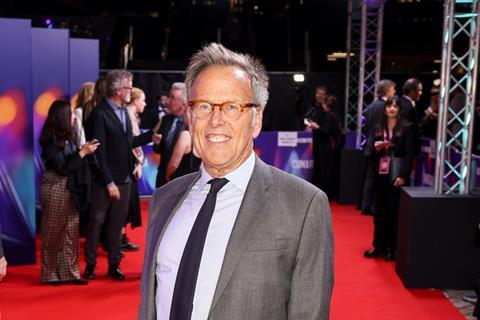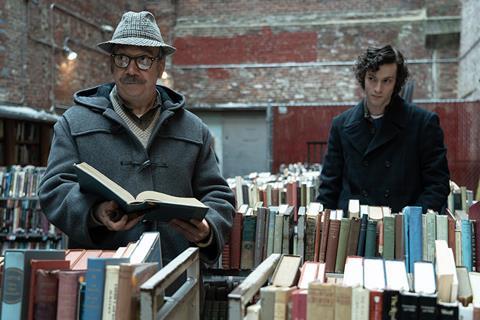Forty-five years after winning the Academy Award for Rain Man, and more than four decades since his last Oscar nomination, Mark Johnson is back in contention with The Holdovers. He discusses his rich career with Screen.

If there is a common theme in the almost 50 films produced by Mark Johnson it is, he suggests, family. “Not necessarily the family you’ve been born into,” the Hollywood veteran explains, “but the family you make, the people you surround yourself with who support you.”
That second kind of family is at the centre of The Holdovers, the best picture Oscar and best film Bafta nominee that Johnson produced for director Alexander Payne. In the comedy-drama, Paul Giamatti (reuniting with Payne two decades after their Oscar-winning Sideways), Da’Vine Joy Randolph and newcomer Dominic Sessa play a teacher, a cook and a pupil respectively at a New England boarding school, who forge an unlikely bond over their Christmas break.
Set in 1970, the film was also shot to look and feel as if it were made in 1970. And while that approach might seem like a tough sell in an age of effects-heavy blockbusters, Johnson — originally enlisted by Payne to give his input on early drafts of the script by David Hemingson — says it was not an impediment when it came to financing the project.
Though The Holdovers “takes its time and is very much about characters”, Johnson concedes, “the good news is we were not looking for a lot of money. We needed just the right amount of money to make it the way that Alexander makes his films.”
Introduced to potential buyers with Giamatti already attached at the 2021 Cannes market, the project was grabbed by Miramax, whose then-CEO Bill Block “recognised how good it was immediately and was willing to fully finance it and then find a distributor after the fact”, says Johnson.
More than a year later, the then-nearly-completed film was screened privately at the 2022 Toronto International Film Festival and bought by Focus Features in a reported $30m worldwide rights deal. Focus, says Johnson, was “wise enough” to delay the film’s release until last October to allow time for the development of a marketing and distribution plan that has so far helped push The Holdovers to a $35m worldwide gross (with the full effect of a post-Oscar nomination bump and a continuing international rollout still to be registered).
Making the film posed some challenges, involving the use of multiple locations that were combined to create the fictional Barton Academy setting, and a protracted casting search for Dominic Sessa, a prep school actor who had never performed on screen before. The hunt going down to the wire “certainly added to my stress level”, Johnson reports.
The producer’s job was made a little easier, however, by Payne’s meticulous preparation and renowned facility for working with actors. “He’s a very self-confident director,” says Johnson, “and he knows what he wants and will keep searching until he gets it. He is a stickler for development, for locations scouting, for casting and also for shooting days. He’s not profligate in any way at all, but he does need his days.”
Teaming up

Johnson and Payne’s relationship had begun several years before The Holdovers when the two, both fluent Spanish speakers, had come together to develop a project based on a South American short story. That project did not come to fruition, but it prompted Payne to ask Johnson to produce Downsizing, the director’s 2017 sci-fi satire starring Matt Damon.
With a reported budget of $70m and a plot demanding effects work to ‘shrink’ much of its cast, Downsizing, which ultimately under-performed at the box office, was “difficult” for Payne, Johnson recalls. “I had some experience with visual effects and that sort of thing. Alexander had never done anything with complicated visual effects and I’m not sure it’s something he will jump at doing again.”
Working together, however, was a “very good experience” for director and producer, says Johnson, and led happily to The Holdovers, a project that, by contrast, is “very much what‑you-see-is-what-you-get”.
Repeat collaborations — with Steven Soderbergh, Michael Apted, Vince Gilligan and others as well as Payne — have been another recurring feature of Johnson’s 40-year producing career.
After a brief initial run as an assistant director, he partnered with Barry Levinson at the start of the 1980s and produced (latterly under the pair’s Baltimore Pictures banner) all of the writer-director’s late-1980s and early-1990s films, among them The Natural, Good Morning, Vietnam and 1989 best picture Oscar winner Rain Man.
Going out on his own in the 1990s, Johnson turned his producorial hand to features as varied as Clint Eastwood’s A Perfect World, Gilligan’s Home Fries, Mike Newell’s Donnie Brasco and Dean Parisot’s Galaxy Quest. More recently, under his Gran Via Productions banner, projects have included The Rookie, The Notebook and all three entries in the Chronicles Of Narnia fantasy franchise. Under Gran Via’s TV deal with AMC, Johnson has executive produced Gilligan’s classic series Breaking Bad (drama series Emmy winner in 2013 and 2014) and Better Call Saul.
And in the international arena Johnson, who spent part of his youth in Spain, has recently produced Fever Dreams, from Peruvian director Claudia Llosa; Blondi, directing debut of Argentinian actress Dolores Fonzi; and Los Impactados, the latest feature from Argentina’s Lucia Puenzo.
Being “sort of film obsessed” and keeping up with other producers’ work has helped Johnson adapt to ever-changing industry trends and tastes, he believes. “I want to stay as relevant as I possibly can,” he says. “And I don’t assume anything. Each time I start a new film, it’s different. More often than not I’m working with financiers I don’t really know and I have to prove myself yet again.”
Being “in love with Hollywood”, meanwhile, resulted in Johnson’s 20-plus years on the board of the Academy of Motion Picture Arts and Sciences and 17 years as chair of the Academy’s foreign-language film (now international feature) category selection committee.
He ended his run on the Academy’s board in 2022 (though he remains a member of the producers’ branch) and feels there have been “a lot of very positive developments” along with “a couple of missteps” at the evolving Oscar organisation.
His stint on the foreign-language film committee — where he helped reform the perennially controversial selection process — ended in 2018. But over his time as chair, he says, “I became very close to a lot of international filmmakers, and there are a number of them I’ve worked with and want to continue working with.”
Gran Via’s current slate includes second seasons of Interview With The Vampire and Mayfair Witches, the first two titles in an Anne Rice franchise that Johnson is overseeing for AMC. And for Amazon’s Prime Video, there is a series version of The Magnificent Seven in the works.
On the film side Johnson is teaming with Alfonso Cuaron — whose 1995 US directing debut A Little Princess he produced — to produce Billy Please Call Home, based on a screenplay Cuaron wrote 20 years ago. The repeat collaborators hope to get into production, for socially conscious storytelling company Participant, later this year.
As the slate suggests, even at 78 years old, Johnson has no plans to slow his pace. “If I ever come to the conclusion that I’ve become irrelevant, then I’ll probably pack it up,” he says. “But right now, I’m working with so many exciting filmmakers and I’m excited about the television shows. It’s really too much fun.”







![In a whisper[17].jpg](https://d1nslcd7m2225b.cloudfront.net/Pictures/274x183/0/2/3/1472023_inawhisper17.jpg_579998_crop.jpeg)
















No comments yet